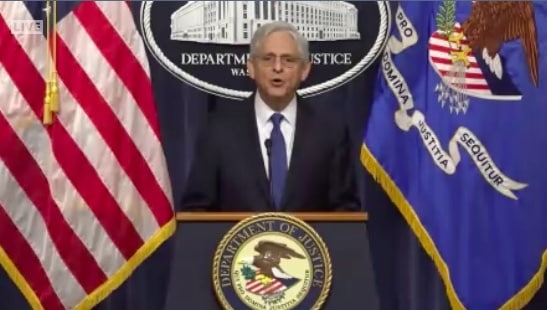On Friday, Attorney General Merrick Garland appointed career prosecutor and U.S. Attorney for the District of Delaware David Weiss as special counsel to investigate “allegations of certain criminal conduct” by Hunter Biden, the President’s son.
Garland said he had notified the designated members of Congress about Weiss’ appointment, adding that he had begun his investigation surrounding Hunter Biden in 2019 during the Trump Administration and has remained on the case.
In July, an agreed-to guilty plea by Biden was put on hold when the initial plea deal, related to tax and gun possession charges, between federal prosecutors and Biden hit a snag in federal court in Delaware.
Republicans blasted the plea agreement as a “sweetheart deal,” and have pointed to allegations by an IRS whistleblower as evidence of a criminal justice system that’s weighed unfairly in favor of the President’s son.
Weiss defended his lengthy investigation in a two-page letter to House Republicans, insisting that the Department of Justice department “did not retaliate” against Shapley after the IRS employee had reached out to Congressional investigators about the Biden case.
In his letter, Weiss also pushed back against allegations by whistleblower Gary Shapley that the DOJ blocked him from pursuing criminal charges in Los Angeles and Washington, saying that on the contrary, he was assured by the DOJ that if he sought to bring charges in a venue other than Delaware, he would be granted special status to do so. Generally, U.S. Attorneys are limited to their own jurisdictions when bringing criminal charges.
In his capacity as special counsel, Garland said Weiss “would be permitted to continue his investigation, take any investigative steps he wanted, and make the decision whether to prosecute in any district.”
Further, Garland said, “Mr. Weiss has told Congress that he has been granted ultimate authority over this matter, including the responsibility for deciding where, when and whether to file charges, and for making decisions necessary to preserve the integrity of any prosecution consistent with federal law, the principles of federal prosecution and departmental policies.”
In his July letter to Congress, Weiss had said that he had not to that point requested special council designation. But according to Garland, “On Tuesday of this week, Mr. Weiss advised me that in his judgment, his investigation had reached a stage at which he could continue his work as a special counsel, and he asked to be so appointed.”
Upon consideration, Garland agreed to that request.
“This appointment confirms my commitment to provide Mr. Weiss all the resources he requests,” Garland continued. “It also reaffirms that Mr. Weiss has the authority he needs to conduct a thorough investigation and to continue to take the steps he deems appropriate independently based on the other facts and the law.”
Weiss will also continue to serve as U.S. Attorney for the District of Delaware as he takes on his special counsel investigation, during which he will not be subject to the day-to-day supervision, according to Garland, “but he must comply with the regulations, procedures and policies of the [Justice] Department.”
Consistent with the special council regulations, at the conclusion of his investigation Weiss will provide Garland with a report explaining any prosecution decisions he reaches.
“The men and women undertaking this investigation are public servants who have dedicated their careers to protecting the citizens of this country,” Garland concluded. “The appointment of Mr. Weiss reinforces for the American people the Department’s commitment to both independence and add accountability in particularly sensitive matters. I am confident that Mr. Weiss will carry out his responsibilities responsibility in an evenhanded and urgent manner, and in accordance with the highest traditions of this Department.”


